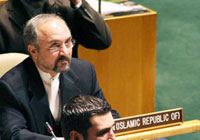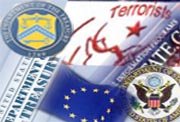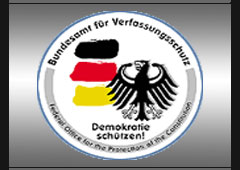The family members of victims of MKO terrorist attacks have cautioned the EU against becoming the organization’s “partner in crime”.
“As victims of MKO terrorism, we advise the European Union  not to turn into the group’s collaborator in their atrocities against the Iranian nation,” reads a statement from the family members.
not to turn into the group’s collaborator in their atrocities against the Iranian nation,” reads a statement from the family members.
The victims had gathered in front of the British embassy in Tehran in protest at a recent decision to remove the group known as the ‘Rajavi cult’ from a list of banned terrorist groups in the EU.
“When Masoud Rajavi and his group launched their terrorist attacks in Iran in 1981, European counties not only did not condemn their atrocities but also gave them refuge in their countries,” adds the statement.
The Mujahedin Khalq Organization (MKO), which identifies itself as a Marxist-Islamist guerilla army, was founded in Iran in the 1960s but was exiled some twenty years later for carrying out numerous acts of terrorism inside the country.
The terrorist group is especially notorious for the help it extended to former dictator Saddam Hussein during the war Iraq imposed on Iran (1980-1988).
The group masterminded a slew of assassinations and bombings inside Iran, one of which was the 1981 bombing of the offices of the Islamic Republic Party, in which more than 72 Iranian officials were killed, including then Judiciary chief Ayatollah Mohammad Beheshti.
“The Rajavi cult has conducted its campaign of terror in Iran with the support of the European governments and from their safe havens inside the European capitals,” the families said.
In recent months, high-ranking MKO members have been lobbying governments around the world to acknowledge the dissidents as those of a legitimate opposition group.
During the revolution in Iran, the group criticized Ayatollah Ruhollah Khomeini for releasing the American diplomats, arguing that they should have been executed instead.
The United States and Canada have refused to drop the MKO from their lists of terrorist organizations.
The group has also been engaged in cult-like activities such as psychological coercion techniques and physical abuse.
The group has also resorted to ‘forced sterilization’ as a strategy to prevent members from leaving the group.
The MEK’s terrorist activities
Iran has filed a complaint to the UN on the recent EU decision to remove the Mujahedin Khalq Organization from its list of terror groups. 
"The European Union must realize that a political approach to terrorism, which threatens the lives and security of people around the world, is totally unacceptable for the global public opinion," Iran’s permanent envoy to the United Nations, Mohammad Khazaei, wrote in a Wednesday letter to the UN Secretary General Ban Ki-moon.
"The EU’s politically motivated decision will not change the terrorist nature of the group. It will not ‘turn the page’ of history on the cult’s terrorist activities and massacre of innocent civilians, nor will it cleanse the terrorist group of its criminal past," he added.
Khazaei added that the removal of the group from the European list of terror organizations had caused great pain for over 14 thousand people who had lost their family members in MKO terror attacks.
The Iranian envoy called on the EU to revise its decision by sending a collection of evidence it has to European courts explaining the terrorist nature of the MKO, and resolving the technical objections that had led to the court ruling.
On Monday EU ministers removed the exiled anti-Iran group from their list of terror organizations, following a European court ruling in favor of the group, which has accepted responsibility for many deadly attacks against Iranian and Iraqi civilians and cooperated actively with the regime of former Iraqi dictator Saddam Hussein.
In one of their deadliest attacks, the MKO carried out a 1981 bombing that killed Iranian Judiciary chief Ayatollah Mohmmad Beheshti and 71 other senior officials.
Among their most recent terror activities is the 1999 assassination of the chief-of-staff of Iran’s Armed Forces, Ali Sayad Shirazi, just outside his house in the early hours of April 10th, as he was preparing to leave for work.
MKO is notorious for the cult like tactics it uses against its members, and the murder and torture of its defectors.
Numerous articles and letters posted on the internet by family members of MKO recruits confirm reports of the horrific abuse that the group inflicts on its own members and the luring recruitment methods it uses.
http://www.presstv.com/Detail.aspx?id=84026§ionid=351020101
A State Department Spokesman says the US administration will not change the terrorist status of the Mujahedin Khalq Organization (MKO).
“We’ve already done a review and it was determined that there would not be a revocation of that status for the Mujahedin-e Khalq, so nothing has changed from our standpoint,” Robert Wood said at a briefing on Monday, when asked if Washington would follow the action taken by the European Union.

The EU removed the MKO from its list of terrorist organizations on Monday. The move outraged the Iranian Foreign Ministry, which in a statement, called the decision incomprehensible.
Wood added that there had not been ‘any change at this point’ in the status of the MKO, suggesting that the new administration was unlikely to alter its stance on the outlawed group.
The US announced on Jan. 12 that labeling the MKO as a terrorist group was an appropriate act and that the group had to remain on the blacklist.
The MKO, blacklisted as a terrorist organization by many international entities and countries including the US, is responsible for numerous acts of violence against Iranian civilians and government officials.
The group also attempted an unsuccessful invasion of Iran in the last days of the Iraq-Iran war in 1988.The MKO was involved in the massacre of Iraqis under former Iraqi dictator Saddam Hussein.
G.P. Put on line 27/01/2009 – For Josy Dubié (Belgian MP), there is not a doubt that PMOI is "a sect". The Belgian senator draws from his memories ![Josy Dubié :"They[PMOI/MKO] are still as sectarian as before",](https://st.nejatngo.org/Image/Politician/Josy_Dubie/Josy_Dubie_Belgium_MP_1.jpg) international reporter to the RTBF to affirm it. At the end of the Iraq-Iran war, they are the combatants of this organization which Saddam Hussein had sent like "flesh with canon" at the time of the battle of Mehran, in 1989. The treatment that Moujahidine held for their own troops, the women like the men, and that they applied to their Iranian prisoners were abominable, explains in substance Josy Dubié. "I know them from inside" , continues the senator, " and I can say to you that their behavior is to be brought closer to that of the members of Scientologie". Didn’t they evolve since the Eighties? Josy Dubié does not believe in it at all. "They are still as sectarian as before", he ensures. "However, there is in Iran an opposition much more democratic than that of Moujahidine of the people, the laic opponents, the members of the Communist party Toudeh, the sympathizers of the former Prime Minister Mossadegh ". And Josy estimates that one should not count on OMPI, which " do not represent anything the whole in Iran".
international reporter to the RTBF to affirm it. At the end of the Iraq-Iran war, they are the combatants of this organization which Saddam Hussein had sent like "flesh with canon" at the time of the battle of Mehran, in 1989. The treatment that Moujahidine held for their own troops, the women like the men, and that they applied to their Iranian prisoners were abominable, explains in substance Josy Dubié. "I know them from inside" , continues the senator, " and I can say to you that their behavior is to be brought closer to that of the members of Scientologie". Didn’t they evolve since the Eighties? Josy Dubié does not believe in it at all. "They are still as sectarian as before", he ensures. "However, there is in Iran an opposition much more democratic than that of Moujahidine of the people, the laic opponents, the members of the Communist party Toudeh, the sympathizers of the former Prime Minister Mossadegh ". And Josy estimates that one should not count on OMPI, which " do not represent anything the whole in Iran".
Lalibre.be
PARIS ” The Canadian government rejected Monday a call to follow Europe’s lead and remove an Iranian resistance group from its list of banned international terrorist organizations.![]()
The European Union, saying it was forced to comply with a series of court decisions by the European Court of Justice, announced on Monday it would end the ban imposed on the People’s Mujahedeen Organization of Iran (PMOI).
But a spokeswoman for Public Safety Canada said there will be no change considered until the next two-year statutory review of banned groups such as PMOI, also known as Mujahedeen-e Khalq (MEK).
"The Government of Canada is determined to take decisive steps to ensure the safety of Canadians against terrorism," Jacinthe Perras said in an e-mailed statement.
"The MEK is a listed entity pursuant to the Criminal Code. It is a criminal offence to knowingly deal with the assets of a listed entity or knowingly participate in any activity that would enhance its ability to carry out a terrorist act. "
The latest December court ruling by the European court said the EU had breached the PMOI’s right to self-defence by failing to inform the group of new information used to keep blacklisting it.
"What we are doing today is abiding by the resolution of the European court," Javier Solana, foreign policy chief for the 27-nation EU, told reporters in Brussels.
The group was banned by the U.S. in 1997, by the EU in 2002, and by Canada in 2005.
Iranian state radio has condemned the EU’s move as "irresponsible," while the group’s affiliated political arm praised the decision that it said will free millions of dollars in assets frozen in western bank accounts.
"Removing the terror tag is a crushing defeat to Europe’s policy of appeasement" and a blow against the "mullahs’ medieval regime" in Iran, according to a statement from Maryam Rajavi, who is described as the "president-elect" of the Paris-based resistance movement.
Fears have been expressed that the delisting could impair international efforts, now being led by U.S. President Barack Obama, to convince Iran to suspend its nuclear program.
David Kilgour, a human rights advocate and former junior foreign affairs minister in Jean Chretien’s Liberal government, said Canada should follow Europe’s lead.
"Canada’s long-term political and economic relations (with Iran) are best-served by standing with its people, not the regime," Kilgour said in a statement.
"The time for appeasing the ayatollahs and suppressing the Iranian opposition must end."
The Canadian government included the PMOI when it extended late last year the list of banned groups that have "knowingly carried out, attempted to carry out, participated in or facilitated a terrorist activity or is knowingly acting on behalf of, at the direction of or in association with such an entity."
Among those on the list are al-Qaida, Hamas, Hezbollah, Peru’s Shining Path, the Sikh terror organizations Babbar Khalsa and the International Sikh Youth Federation, and the Tamil Tigers of Sri Lanka.
The PMOI was formed as a leftist organization in the 1960s opposed to the U.S.-backed regime of Shah Mohammed Reza Pahlavi. It was allied with the Islamist forces of Ayatollah Ruhollah Khomeini in the Shah’s 1979 overthrow, and engaged in assassinations of American targets before the revolution.
It also took part in the hostage-taking incident at the U.S. embassy shortly after the Shah fled the country that year.
But the group broke with Khomeini and then allied with the late Iraqi dictator Saddam Hussein during the Iran-Iraq War of 1980-88. They established bases in Iraq and took part in a number of bombings and assassination attempts against Iranian government targets as late as 2001, according to a 2008 analysis by the Council on Foreign Relations, a Washington-based think-tank.
"While the group says it does not intentionally target civilians, it has often risked civilian casualties. It routinely aims its attacks at government buildings in crowded cities," the analysis noted.
However, the group’s terrorist activities declined after 2001, and its fighters were disarmed by U.S. forces after the American invasion of Iraq in 2003. There are currently about 3,500 members at a camp there, including 60 Iranians with Canadian citizenship, according to Winnipeg human rights lawyer David Matas, who was in Brussels with Kilgour Monday.
The U.S. State Department regularly refers to PMOI as a "cultlike terrorist group" because of the control wielded by the two leaders, Massoud Rajavi and his wife Maryam, who have followers worldwide.
"In addition to its Paris-based members (PMOI) has a network of sympathizers in Europe, the United States, and Canada," according to the Council on Foreign Relations analysis.
The PMOI has won considerable political support in western countries, from politicians and activists like Kilgour, as it calls for a fully democratic Iran that endorses the free enterprise system with full rights for women and ethnic and religious minorities.
By Peter O’Neil, Europe Correspondent, Canwest News
TEHRAN – Germany’s Federal Intelligence Agency (BND) has released a report on the National Council of Resistance of Iran (NCRI), calling it a “fake parliament”. 
The NCRI is a part of the terrorist Mojehedin Khalq Organization (MKO) and is headed by Maryam Rajavi.
The BND also stated that the military wing of the MKO is “an army of insurgents”.
Not only are the MKO leadership’s claims to adherence to democratic values disingenuous, but they also follow the tenets of Stalinism and use brainwashing techniques, the report noted.
The report also stated that the MKO finances itself through activities such as economic fraud, the production of false documents, and using children to get donations from charity organizations.
The European Union removed the MKO from its blacklist of terrorist groups on Monday
http://www.tehrantimes.com/index_View.asp?code=188028
BERLIN – The notorious MKO terror group will continue to be monitored by Germany’s domestic Verfassungsschutz intelligence agency despite the decision by the European Union to delist the MKO , a German government source told IRNA in Berlin Tuesday. 
Just because the EU has lifted the ban, it does not mean that we don’t have our own national security considerations, the official said, speaking on condition of anonymity.
For instance, parts of the German Left party are being subjected to surveillance by the Verfassungsschutz although they are not blacklisted by the EU, he added.
The official made clear that Germany’s federal secret service and its state branches will continue their observation of the MKO.
Each German state has also its own separate Verfassungsschutz intelligence apparatus.
The MKO has been involved in the mass killings of thousands of innocent Iranians over the past 30 years.
Furthermore, the Israeli-backed MKO terror grouplet has also collaborated with the former Saddam regime, in brutally massacring tens of thousands of Iraq Kurds and Shiites.
Head of MKO terrorist group Maryam Rajavi is expected to remain excluded from the UK despite the EU dropping the previously outlawed group from its proscribed list.
British Foreign Office said that although it does not discuss individual cases of exclusion, the government continues to believe that the MKO or MeK, as it prefers to call it, was ‘responsible for vile acts of terrorism over a long period’.
"If an individual has made public statements in the past supporting or condoning terrorism, and has not publicly and unambiguously apologized and refuted such statements, then this would constitute grounds for not admitting an individual into the UK," Foreign Office spokesman Barry Marston said.
"We are not satisfied that the MeK has done enough to distance itself from its past. There is no dispute about its previous terrorist activity: it claimed responsibility for a large number of violent attacks inside Iran for a number of years," Marston told IRNA.
Rajavi was subject to an exclusion order back in October 1997, which banned her entry to the UK on the grounds that the organization contained a large faction of terrorists. The Foreign Office at the time said her presence was ‘not conducive to the public good’.
The British government insists that the deproscription of the MKO was ‘a judicial and not a political decision’ both in the EU as it was earlier in the UK and that it opposed its removal.
"We have made it clear that we were disappointed by the verdict of the Proscribed Organizations Appeal Commission and of the Court of Appeal, but we had to comply with their decisions," Marston said about the British decision last July.
"Equally, given the clear judgement of the Court of First Instance on December 4, 2008, annulling the MeK’s listing in the EU, the EU had no choice but to observe and respect the court’s judgement," he added.
Asked whether the UK government still considered the MKO as a terrorist organization, he said that there were still ‘serious reservations about the MeK’s assertion that it represents a democratic opposition in exile’.
"We see no evidence of popular support for the MeK in Iran, because of its responsibility for terrorist attacks which resulted in the deaths of many Iranian citizens, and because it fought alongside Iraqi forces against Iran during the Iran-Iraq war," Marston said.
Regarding the potential that the controversial decision could have an adverse effect on Iran’s relations with the UK and the EU as a whole, he stressed that it should ‘not be seen as a political decision’.
"We would not hesitate to re-proscribe the MeK if circumstances changed and evidence emerged that it was concerned in terrorism," the spokesman said.
He also quoted Home Office Minister Tony McNulty insisting last June during the debate on the deproscription of the MKO that the UK government have ‘no plans to meet its representatives’.
EU removes Iranian group from terrorism list
The new status of the Mujahedin Khalq organization, which seeks to overthrow the Iranian government, is likely to complicate international diplomacy with Tehran.
Tehran.
Reporting from Paris and Beirut — The European Union on Monday announced the removal of a high-profile Iranian opposition group from its list of terrorists, a victory for a movement that European governments have described as a dangerous sect and prosecuted on terrorism charges.
The change in the status of the Mujahedin Khalq organization, or MKO, which seeks to overthrow the Iranian government, is likely to complicate attempts by the international community to reach a diplomatic settlement with Tehran over a range of issues.
The decision, announced at a meeting of EU foreign ministers in Brussels, results from recent legal and diplomatic developments combined with intense lobbying by the group, whose leader, Maryam Rajavi, lives in France.
Iran’s Foreign Ministry issued a statement decrying the ruling as a violation of U.N. Security Council Resolution 1373, which requires governments to freeze the funds and halt the activities of those involved in acts of terrorism.
"The MKO’s hands are stained with the blood of thousands of innocent Iranians and non-Iranians," said the statement, according to the Iranian Students News Agency. "The delisting is invalid and condemned."
![]() Analysts said European leaders probably acted out of diplomatic expediency because of the impending expulsion from Iraq of nearly 3,000 members of the opposition group’s military wing, who once fought against their homeland on behalf of Iraqi leader Saddam Hussein. Europe may find itself providing refuge for some of those fighters, and could not do so if the terrorist label persisted.
Analysts said European leaders probably acted out of diplomatic expediency because of the impending expulsion from Iraq of nearly 3,000 members of the opposition group’s military wing, who once fought against their homeland on behalf of Iraqi leader Saddam Hussein. Europe may find itself providing refuge for some of those fighters, and could not do so if the terrorist label persisted.
Iran quickly signaled that the move could complicate deliberations with the West, which wants Tehran to curtail sensitive aspects of its nuclear program and rein in support for militant groups opposed to Israel.
"The EU plans to use the MKO as leverage against Iran in the nuclear talks," said an editorial Monday in the conservative daily Politics of the Day. "The EU should tell the world why it blacklists Lebanese and Palestinian resistance groups fighting Israeli aggression but clears the MKO, which has committed countless crimes in Iran and Iraq."
Protesters in Tehran gathered around the French and German embassies to denounce the decision, according to the official Islamic Republic News Agency, demanding the "extradition" of MKO members "who have killed many of our children and families."
Opposition leader Rajavi in turn described the decision as a "stinging defeat for the European policy of complacency" toward the Iranian regime. "The inscription of the Iranian resistance on the blacklist has helped prolong the regime of religious fascism in Iran," she said, according to a report by Agence France-Presse.
The MKO remains on the U.S. list of terrorist organizations, a designation it acquired in 1997. European leaders made it clear Monday that they do not view the organization as fully rehabilitated. French Foreign Minister Bernard Kouchner and several colleagues warned that the MKO could be again designated as a terrorist group depending on its activities and on a French appeal of a Dec. 4 decision by an EU court to unfreeze nearly $9 million of the group’s assets.
The MKO was founded in the 1960s as a radical and often violent guerrilla group opposed to the U.S.-backed monarchy of Mohammed Reza Shah Pahlavi. It took part in the 1979 revolution that ousted him.
But the group quickly fell out with Ayatollah Ruhollah Khomeini and the rest of the country’s clerical leadership. Many of its supporters were jailed, and the MKO launched a campaign of bombings against leaders of the revolutionary government.
During the 1980s Iran-Iraq war, the group fought alongside Hussein’s troops against the Islamic Republic, a move that earned it the anger of many Iranians. Iraqi Kurds allege that the MKO helped crush an uprising against Hussein after the 1991 Persian Gulf War.
Several thousand members live in Camp Ashraf, a desolate patch of desert and tumbleweed near Baqubah, Iraq. A 2005 report by Human Rights Watch said the camp was rife with abuse, citing evidence of "prolonged incommunicado and solitary confinement" as well as "beatings, verbal and psychological abuse, coerced confessions, threats of execution, and torture" against members who don’t conform to the group’s sometimes bizarre rules and rituals.
Its blend of Islamist and Marxist ideologies alienates both supporters and opponents of the Islamic Republic. Iran watchers in Europe and the U.S. say the organization has little public appeal. But it mounted an all-out lobbying campaign that won over legislators, especially in Britain, according to Farhad Khosrokhavar, an Iranian French expert on Islamic extremism.
"They have been very successful at giving a positive picture of themselves in Europe," Khosrokhavar said in a telephone interview. "I think many people have been duped by them, especially in the British Parliament."
Khosrokhavar predicted that the EU decision would only increase Iran’s animosity toward the West.
"The Islamic Republic will be stronger in its suspicion of the West and European Union," he said. "My guess is they will be angry, and the one issue where they will be even more inflexible is the nuclear issue."
Rajavi and other leaders were arrested in 2003, when more than 1,000 police officers raided their compound outside Paris. France’s top anti-terrorism judge charged that they were involved in terrorism in Iran and plotting violence in Europe as well.
The investigation, which was assisted by the FBI in the United States, did not turn up powerful proof. A lawyer for the group said Monday that prosecutors should throw out the still-pending case.
"One finds oneself confronting a judicial dossier that is empty of substance after the removal from the list," said the lawyer, Patrick Badouin, according to French reports.
daragahi@latimes.com
Times staff writer Sebastian Rotella in Madrid contributed to this report.
By Achrene Sicakyuz and Borzou Daragahi
http://www.latimes.com/news/nationworld/world/la-fg-iran-opposition27-2009jan27,0,1790285.story
The European Union has agreed to remove the notorious Mujahedin Khalq Organization (MKO) from its list of banned terrorist groups. 
EU foreign ministers approved a decision to remove the outlawed terrorist group from a list that includes Palestinian Hamas and Sri Lanka’s Tamil Tigers, an unnamed European official was quoted by Reuters as saying.
The group also known as the”Rajavi cult”named after its leader Maryam Rajavi stepped up efforts to be excluded from the list in 2008.
In November Rajavi met with members of the German Parliament in a bid to rally support for the removal of the group from the European Union’s list of terrorist organizations.
The European Court in Luxembourg ruled in December that the EU was wrong to keep the group’s assets frozen.
“What we are doing today is abiding by the resolution of the European court,”EU foreign policy chief Javier Solana told reporters just before the ministers finalize the decision in a meeting in Brussels.
The MKO, which has been listed as a terrorist organization in Iran and the United States, has a long and bloody history of targeting Iranian civilians and government officials.
Incidents linked with the group include the June 1981 bombing of the offices of the Islamic Republic Party in which 72 high-ranking Iranian officials including judiciary chief, Ayatollah Mohmmad Beheshti, and tens of Majlis deputies were killed.
In the following August the group assassinated President Mohmmad Ali Rajae’i, Prime Minister Javad Bahonar and National Police Chief Ali Dastgerdi at the Prime Ministry building.
The MKO also assisted Iraqi dictator, Saddam Hussein, in the massacre of thousands of innocent Iraqis and is responsible for several acts of terror in Iran including the 1994 bombing of a revered Shia shrine in Mashhad, eastern Iran.
In 2003, French anti-terrorist police arrested 165 members in Paris, including Maryam Rajavi, for ‘associating with wrongdoers in relation with a terrorist undertaking.’
More recently, around 10 members of the notorious organization were arrested in France and Switzerland on charges of money laundering on September 29, 2008.
